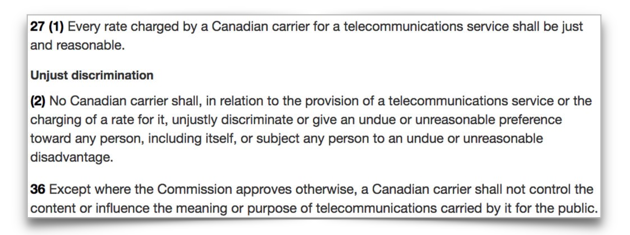
A House of Commons committee has recommended that Parliament formally enshrine net neutrality provisions into Canadian law.
As part of its The Protection of Net Neutrality in Canada report, the Standing Committee on Access to Information, Privacy and Ethics (ETHI), has released a collection of five recommendations — the first of which suggests that the Government of Canada consider enshrining the principle of net neutrality in the Telecommunications Act.
As it stands, the term ‘Net Neutrality’ doesn’t actually appear in the Telecommunications Act.
However, sections 27(2) and 36 enumerate a certain amount of protection that the Canadian Radio-television and Telecommunications Commission (CRTC) has previously used to uphold Canadian net neutrality.

That being said, ETHI’s concern is that net neutrality protections in Canada are dependent on the CRTC’s interpretation of those two sections of the Telecommunications Act.
“Sections 27(2) and 36 of the Act were adopted in 1993, before the term ‘net neutrality’ came into existence,” reads an excerpt from the ETHI committee’s report.
“However, the provisions were written in a technology-neutral manner, which has allowed [the CRTC] to protect net neutrality in Canada through its interpretation of the provisions, outlined in telecommunications decisions, and through the adoption and application of telecommunications regulatory policies.”
As such, the ETHI committee recommended explicitly enumerating net neutrality protections, In order to ensure that Canadian net neutrality, and Canadian access to the open internet, remain in place.
It’s important to note that Liberal MP for Oakville, Ontario John Oliver has already proposed a bill that would enshrine net neutrality into Canadian law.
Oliver’s proposed legislation can be read here.
Speaking with stakeholders
The committee held four meetings between December 6th, 2017 and February 15th, 2018 in order to discuss the issues presented in the report.
In that time, the committee met with a number of industry stakeholders and legal minds, including University of Ottawa law professor Michael Geist, CRTC executive director of telecommunications Christopher Seidl, Columbia Law School professor Tim Wu (who is also known as the father of net neutrality), as well as representatives from Canada’s major service providers.
While Geist and Wu were more open to the idea of formally enshrining net neutrality protections, representatives from Bell, Telus, Rogers and Quebecor expressed hesitation, arguing that Canadian net neutrality protections are already some of the strictest in the world.
A word from advocacy groups
John Lawford, executive director and general counsel for the Public Interest Advocacy Centre (PIAC), told MobileSyrup that he too believes that Canadian law already ensures net neutrality protections.
“The [Telecommunications Act] is dead clear that we have net neutrality,” said Lawford, in a phone interview with MobileSyrup.
“I think everybody’s scared because of the U.S…. but it’s already in the Act and we’ve had a couple of decisions saying it’s in section 27 already.”
Katy Anderson, a digital rights specialist at open internet advocacy group OpenMedia, told MobileSyrup that she believes the report’s recommendations are excellent.
“It’s great to hear a Parliamentary committee say that net neutrality should be at the heart of the Telecommunications Act, and it’s also great to see that all parties signed onto the report,” said Anderson, in a phone interview with MobileSyrup.
Source: ETHI
MobileSyrup may earn a commission from purchases made via our links, which helps fund the journalism we provide free on our website. These links do not influence our editorial content. Support us here.


